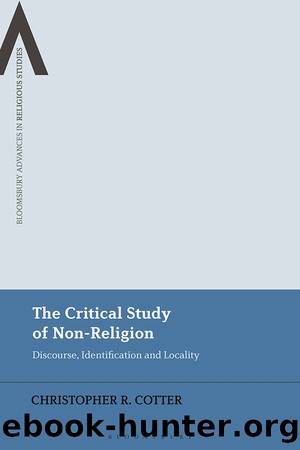The Critical Study of Non-Religion by Christopher R. Cotter

Author:Christopher R. Cotter [Cotter, Christopher R.]
Language: eng
Format: epub
Tags: Social Science, Sociology of Religion, Religion, Atheism, Sociology, General
ISBN: 9781350095250
Google: kH7vDwAAQBAJ
Publisher: Bloomsbury Publishing
Published: 2020-07-09T04:35:08+00:00
5
Religion and non-religion as acts of identification
[T]here is no such thing as identity, only operational acts of identification. The identities we talk about so pompously, as if they existed independently of those who express them, are made (and unmade) only through the mediation of such identificatory acts, in short, by their enunciation. (Bayart 2005: 92)
This chapter argues for setting aside the particularities of the religion-related âidentitiesâ of individuals and communities, viewing them rather as âoperational acts of identificationâ (Bayart 2005). Through these relational acts of identification, social actors make use of discursive resources to contextually position themselves and others in relation to religion. Providing further support for the argument advanced in the preceding chapter, some of these contextual acts result in the positioning of phenomena as ânon-religiousâ, in Lois Leeâs sense of being âprimarily understood in relation to religionâ but not being âconsidered to be religiousâ (2015: 32). In other cases, the non-religious is implicit in the subject position of particular actors. In all cases, religion-related terms have the potential to be constructed as âpower categoriesâ, acting in dialectical interplay with other power categories such as âpoliticsâ, âscienceâ or ânatureâ (Fitzgerald 2015b).
From identities to identifications
In Chapter 2 I argued that a major problem with substantive approaches to non-religion is the ease with which identity talk becomes ideal-typical. This is problematic because although the âideal typeâ was conceptualized by Weber such that it âis only rarely encountered in historical realityâ (cited in Bayart 2005: 34), it is almost invariably the case that its artificial and constructed nature becomes lost in translation, giving the false impression that individuals can be easily boxed off into one of a discrete number of types. Whilst such work is very valuable for macro-level analysis, it fundamentally breaks down at the level of the individual where heterogeneity, contextuality, âindeterminism, incompletion, multiplicity and polyvalenceâ abound (Bayart 2005: 109): there is âno such thing as a perfect or ideal-typical formâ of difference to âreligionâ (Lee 2015: 44).
Much has been written in recent years on how the logics of survey methodologies such as censuses can encourage individuals to claim certain identities which might not be claimed in other circumstances, or which do not simplistically map on to other aspects of individual belief, practice or values â particularly when the identities at focus are religion-related (Day 2011; Day and Lee 2014; Wallis 2014; Lee 2015). Indeed, Gervais and Najle (2018) have recently conducted some ground-breaking work utilizing the âunmatched count techniqueâ (cf. Dalton, Wimbush and Daily 1994; Raghavarao and Federer 1979) to propose that âroughly one in four (26%) American adults may be atheists â 2.4â8.7 times as many as telephone pollsâ suggest (Gervais and Najle 2018: 8). They go on to argue that the âdisparity between self-report and indirectly measured atheism rates underscores the potent stigma faced by atheists (Edgell, Gerteis and Hartmann 2006; Gervais 2013), as even in an anonymous online survey, about a third of American atheists may be effectively âclosetedââ (2018: 8). In short, self-reports are unreliable
Download
This site does not store any files on its server. We only index and link to content provided by other sites. Please contact the content providers to delete copyright contents if any and email us, we'll remove relevant links or contents immediately.
From Bacteria to Bach and Back by Daniel C. Dennett(2145)
The God delusion by Richard Dawkins(1843)
Boy Erased by Garrard Conley(1406)
THE SELFISH GENE by Richard Dawkins(1319)
The Falls by Unknown(1139)
the god delusion by richard dawkins(1083)
Christopher Hitchens by The Portable Atheist: Essential Readings for the Nonbeliever(1067)
THE GOD DELUSION by Richard Dawkins(1052)
Drunk with Blood: God's Killings in the Bible by Steve Wells(1040)
Triumvirate of Rationalism: Thomas Paine, Thomas Jefferson, and George Orwell by Christopher Hitchens(1030)
Outgrowing God by Dawkins Richard(1028)
About the Holy Bible by Robert G. Ingersoll(1019)
Atheism: A Very Short Introduction by Julian Baggini(992)
The Rage Against God by Peter Hitchens(983)
The Atheist Muslim by Ali A. Rizvi(982)
Why I Am Not a Christian and Other Essays by Bertrand Russell(935)
Battling the Gods by Tim Whitmarsh(926)
Emancipation of a Black Atheist by D. K. Evans(919)
God Is Not Great by Christopher Hitchens(908)
